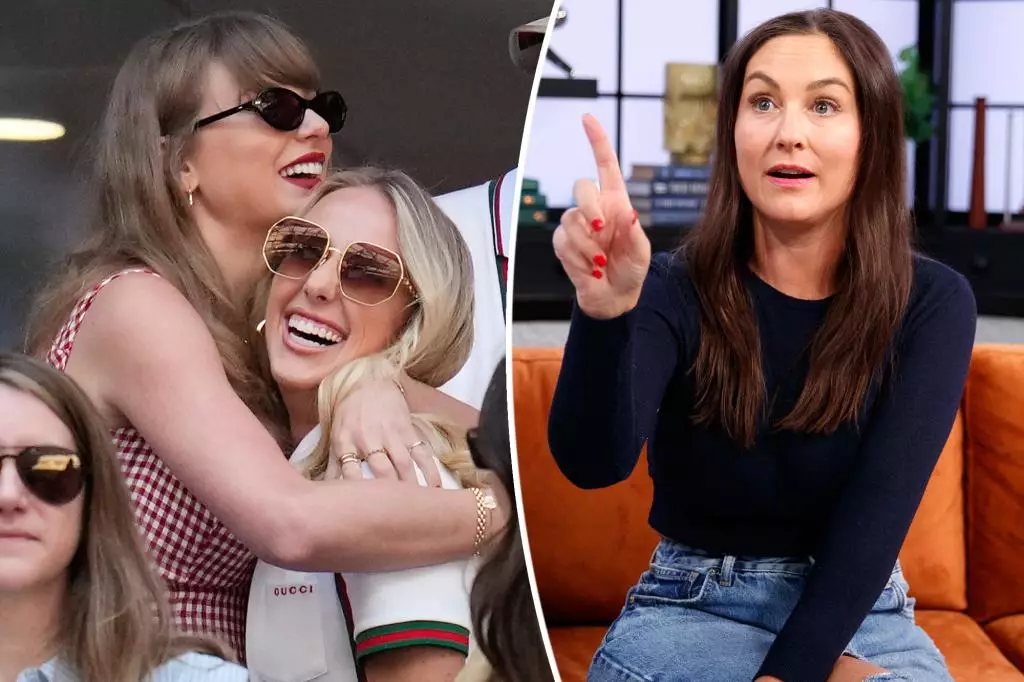In the world of celebrity gossip, friendships often become more than just personal connections; they transform into public spectacles that draw intense scrutiny and passionate opinions. A recent discussion involving Taylor Swift and Brittany Mahomes has ignited controversy, particularly due to the passionate claims made by podcast host Taylor Strecker. With a lens focused on the complexities of fame, connections, and personal worthiness, this analysis seeks to unpack the layers of this unfolding narrative.
Analyzing the Swift-Mahomes Friendship
Taylor Swift, a powerhouse in the music industry, has long been an idol for many, inspiring a legion of fans with her music and public persona. On the other hand, Brittany Mahomes, the wife of Kansas City Chiefs quarterback Patrick Mahomes, has carved out her own realm within the sports world. Their friendship, which blossomed in 2023 after Swift began dating Chiefs tight end Travis Kelce, has drawn a mixed response from the public. Strecker’s criticism—labeling Brittany as “not worthy” of Taylor Swift’s friendship—has raised eyebrows and sparked debate about the nature of such celebrity relationships.
Strecker’s remarks signal a certain gatekeeping mentality rampant within fandoms. This phenomenon, where fans feel entitled to judge who is “worthy” of being associated with their idols, often leads to what can be a toxic environment. By asserting that Brittany is not deserving of a friendship with Swift, Strecker inadvertently elevates Swift to an untouchable pedestal—one that few could ever aspire to reach. This notion of worthiness, intrinsically linked to public success, personal qualities, or lifestyle, speaks volumes about the pressures surrounding celebrity culture.
Strecker’s further observations suggest that Brittany’s induction into Swift’s circle seems almost transactional, linking back to their partners’ friendship. This notion sheds light on how many friendships within high-profile circles are often built upon shared interests and connections—especially when intertwined with romantic relationships. Swift’s social gatherings, frequented by the likes of Blake Lively and Selena Gomez, create an aura of exclusivity. For outsiders, particularly fans, it can be frustrating to witness individuals perceived as “ordinary” becoming part of such glamorous spheres.
However, to dismiss Brittany’s involvement as merely opportunistic overlooks the genuine human element of these relationships. The accessibility of Swift’s life through social media magnifies the connections, leading to assumptions that may not reflect the reality of their interactions. Despite Strecker’s protestations, Brittany may simply embody a more relatable quality that resonates with fans, even if their backgrounds starkly contrast.
A notable point of criticism from Strecker is Brittany’s fashion choices, which she humorously claims “infuriate” her. This comment illustrates another layer of the celebrity friendship dynamic—public perception is entwined with presentation. Fans often form opinions not only based on the personalities involved but also on external factors like aesthetics and style. Brittany’s attire may resonate with some while alienating others, creating a divide that fans and critics alike feel compelled to navigate.
It is essential to recognize, however, that personal styles are subjective. Swift herself has dabbled in different fashion trends over the years, and her choice to befriend people outside her typical sphere can be seen as a reflection of personal growth rather than dilution of her brand. The perceived clash of style between Swift and Brittany thus raises questions about identity, adaptation, and the biases inherent in how we view public figures.
Ultimately, the friendship between Swift and Mahomes serves as a microcosm of broader societal themes—gatekeeping, public perception, and the evolving nature of friendships in the age of social media. The backlash against Brittany underscores an unsettling truth: when it comes to celebrity friendships, acceptance often hinges on public opinion rather than the genuine connections between individuals.
Brittany’s response to critiques on social media emphasizes a pushback against the negativity too often encountered by those in the spotlight. The importance of establishing authentic relationships, irrespective of public approval, stands as a testament to resilience in navigating the ever-watchful eyes of fans and critics. Swift and Mahomes’ alliance is not merely an instance of two celebrities, but rather a dynamic that reflects human connection amid the complexities of fame.
Exploring the intricate relationships in the public realm unveils a nuanced understanding of celebrity interactions and societal expectations, prompting a call to celebrate rather than diminish diverse stories and experiences in every friendship formed within the limelight.

